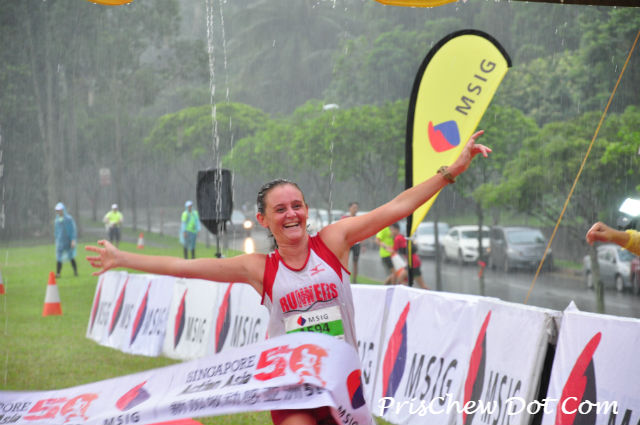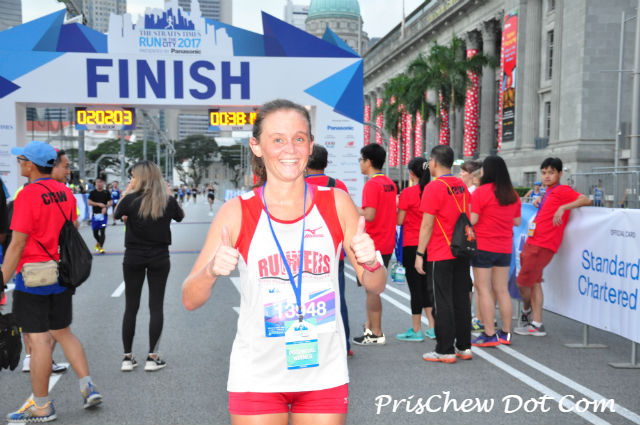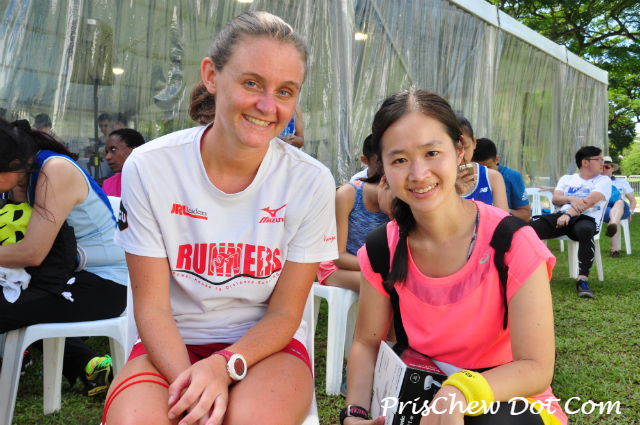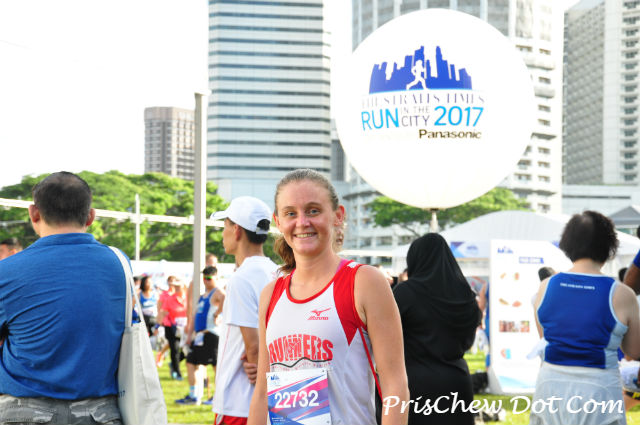Vanja Cnops, 30, first fell in love with running when she was 12 years old and her parents introduced her to the sport, through weekly jogs around their neighbourhood in Belgium, where she is originally from.
Shortly after that, Vanja had joined a running club in Belgium and the members there, encouraged her to join running races. She has been hooked onto the sport since then.

Vanja Cnops started running at age 12.
Said Vanja, “I like running because of the good feeling after the run. To me, running means to stay healthy and it makes me feel good. If I win prizes, it is a bonus.”
Has never lost her running mojo
Since moving to Singapore in 2012, Vanja has never lost the running mojo and has made a name for herself in the Singapore running scene, having picked up several prizes in local races. These include victories in the recent MSIG Action Asia 10km race as well as the 10km category of the Straits Times Run, both of which had taken place last weekend.
She can indeed juggle her work and running well; Vanja also holds down a day job as a researcher in neuroscience at the Nanyang Technology University.

Vanja also holds down a day job as a researcher.
In Singapore, Vanja has also joined a running club, the F1 Runners Team, helmed by Lexxus Tan, and this helps her to push herself and to keep improving in her own running.
Said Vanja, “It is important to keep on enjoying the running. If you enjoy it, you will stay motivated to train and if you train consistently, you will improve automatically.
She added, “To train for speed, it is good to do training on the track. Short distances like 200m to 400m will help to make you a faster runner. You should also train with people who run faster than you, in order to push yourself to the limit. I train with both guys and ladies, who can help me to push myself more.”
Have a variety of speeds in your training
Vanja pointed out that many runners, in training, tend to simply run, and end up doing the same speed for all their runs. She said “I think most runners run the same speed all the time. It is important to have variety of speeds; sometimes you should train faster and other times you should slow down a bit.”

Vanja (left) says that fartlek training is good for runners.
So she pointed out that fartlek training is good for training. Fartlek runs are typically defined as periods of fast running interlaced with periods of slower running. Explained Vanja, “Fartlek runs are good for training varying speeds because you have to run faster and then slow down.”
She added, “Many people try to run 100km or more per week, thinking that a lot of mileage is good, but I think that is not necessary. Too much mileage also causes injuries so I recommend running lesser and doing other cross training like cycling and swimming. For me, I run 10km per run for six days a week. I get up at 6.15am every morning to run before work and I have one rest day every week. Sometimes I may do longer and other times I will run shorter, depending on the stage of training I am at and the race I am preparing for. But I try not to cover too much though.”
But she pointed out that there was one time when she completed four loops of MacRitchie Reservoir in a single run, which is about 40km. That had been her longest run.
Race Tips
In terms of her races, most of the time, Vanja herself competes in 5km and 10km races as well as the occasional half marathon event. Her personal best is a speedy 34 minutes timing for 10km.
On race morning, Vanja would make it a point to eat breakfast before her runs. She said, “I will have something light like bread, two hours before the run. I also need to drink lots of water and stay hydrated for the run.”
And also, what tips does she have for running the race itself?
Said Vanja, “I think that many people tend to start very fast and will end up walking in the latter stages of the race. It is better to run slow at the start and keep running. I also make this mistake sometimes but not too frequently though! In a race there are many people around you and it always feels good to keep running while everyone else is walking.”

Vanja hopes to keep on improving in terms of her running.
Hopes to keep on improving her running
Vanja hopes to continue to improve and keep on getting better, in terms of her own running.
She said, “I hope to keep improving and at the same time, to continue to enjoy running. Goals are important because it helps you to stay motivated to train. Think about your goals and when you wake up early in the morning to train, it is good to have a goal to push you out of the door.”

Very accomplished distance runner and great running tips?